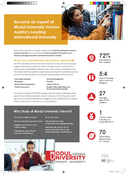Doctorate in Business and Socioeconomic Sciences
Social Entrepreneurship and Investment
Social Entrepreneurship: Social entrepreneurs can be understood as actors who have to simultaneously play economic, political and civic roles while their products and services aim to increase general welfare. This can be seen as improving social capital via economic means. Their positive effect on the community is associated to the promotion of civic values while providing goods and services that are not always available in the market economy. Their behaviour is assumed to be premised on actions that are not motivated by economic gains and are rewarded directly through nonmaterial benefits (status, honour, fame, respect and recognition) or indirectly through an increase in public welfare. This altruistic economic behaviour counters assumptions of self serving entrepreneurs and can be better understood with reference to the multiple roles that guide their actions.
Prominent Social Entrepreneurs are motivated by social responsibility, but also by an iconoclastic need to redefine the world based on their own values. Although there are no surprises in their extensive use of social contacts, they make a sophisticated distinction between bridging and bonding ties. At the same time the big deviation in their reported support networks might indicate something beyond psychological predispositions. They appear equivocal on the value of entrepreneurship and associate success to enabling others. The size of their support network and the network of those they influence could predict variable to their success.
Two characteristics of their economic engagement are unique to these agents. Failure of enterprise is more often associated with status rather than economic loss, while their multiple agendas run against profit and growth motives assumed in classic literature on economic entrepreneurs. The implication is that policy makers attempting to affect the sector would have to amplify the status gain of success and minimise the status loss of failure. It seems reasonable to assume that motives and agendas will be contingent on local values, welfare traditions and levels of social capital. Potentially conflicting agendas of their roles indicate that policies should be multidimensional. An example of this would be a policy that improves (economic) tax incentives, offers (political) access to stakeholders and acknowledges (civic) status to SE. Iconoclastic social entrepreneurs are unlikely to accept engaging with formalised ‘consultation networks’. Their mobilisation of political resources is (with few exceptions) not aimed at public office, but at achieving social goals and furthering their values. Indeed the case can be made that if a shrinking welfare state ‘entrusts’ these actors with a voluntary provision of public goods, they should be entitled to more direct policy input. Incentivising these actors by recognising them as stakeholders and facilitating their access to local and national policy making is a low cost policy tool that can positively impact the growth of the social economy. Research questions may relate to the motivation of social entrepreneurs, multi-dimensional action of social entrepreneurs, or success, failure and impact metrics for social enterprise.
The Start-up Ecosystem: A more recent trend in understanding the complexities and synergies inherent in dynamic economic development, is to perceive regions as governance spaces that facilitate the creation of knowledge and its successful commercialization. This has been called the triple helix model (Etzkowitz and Leydesdorff, 2000) under the core assumption that positive externalities can be attained by the synergistic collaboration between universities, industry and government. Hence an interest on the conduits to the creation and diffusion of innovations, i.e. networks. Current preoccupation of economic and political geographers with sustainability (Truffer and Coenen, 2012) and resilience (Martin and Sunley, 2014) reflects a shift in focus to the long term effects of innovation and attention on growth trajectories beyond spikes in the business cycle. It also puts in perspective economic advantage beyond a temporal dominance in specific sectors or technologies. Finally, states and regions have lost their prominence in the analysis of economic innovation. They have being replaced by a more holistic and locally embedded understanding of innovation that is feasible within ecosystems (Zygiaris, 2013). Such ecosystems are often associated with notable cities or urban agglomerations, such as Boston, Amsterdam, Berlin, Vienna etc.
Investor markets in advanced industrial economies are neither homogeneous nor settled. For instance, angel investors, who were perceived as peripheral only a decade ago are estimated to have equivalent levels of invested capital to professional VCs (OECD, 2011). Current thinking is that angel investors and VCs should play complementary and substitute roles in investor markets (Hellman and Thiele, 2015). While new investor strategies and the recognition of new economic sectors, such as ethical investing (Lewis and Mackenzie, 2000), impact investing (Martin, 2013) and the social economy (Christopoulos & Vogl, 2015) are associated with a growing trend in startup finance for a focus on the social impact and sustainability of investment strategies. A key requirement for understanding entrepreneurial ecosystems is to map them (Auerswald, 2015). And since they are by definition dynamic, this mapping should be continuous and detailed. One indication of market cohesion is syndication. High levels of syndication can be seen as evidence of trust among investors and an indication of maturity in a start-up ecosystem. At the same time mentoring through accelerators, hubs, incubators or other involved collaboration indicates ecosystem vitality and its potential growth prospects. Potential theses topics comprise the motivation of investors (VCs, angels, crowds, corporate, finance, etc.) in the start-up ecosystem, new forms of investor collaborations (angel & crowd; VC & crowd; VC & angel; etc.), the syndication choices of investors in the start-up ecosystem, and the impact of business mentoring on start-up growth.





